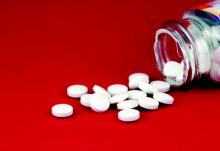SAN ANTONIO – A large randomized controlled trial of aspirin for breast cancer prevention is warranted in light of new evidence that aspirin use shows a strong independent inverse relationship with mammographic breast density, Dr. Marie E. Wood declared at the San Antonio Breast Cancer Symposium.
Breast density, she noted, is well accepted as a modifiable risk factor for both estrogen receptor–negative (ER–) and estrogren receptor–positive (ER+) breast cancer.
“Aspirin could be a promising breast cancer prevention therapy. It is cheap, safe, well tolerated, and there is strong biologic and epidemiologic evidence for a prevention effect for both ER– and ER+ breast cancers,” said Dr. Wood, professor of medicine and director of the familial cancer program at the University of Vermont in Burlington.
There is an unmet need for better chemoprevention agents for breast cancer. The current ones, such as tamoxifen and raloxifene (Evista), don’t prevent ER– breast cancer. Plus, they have substantial side effects leading to low utilization for primary prevention, she continued.
Dr. Wood presented a retrospective study of 26,000 women that demonstrated a dose-response relationship between aspirin use and lower mammographic breast density. The relationship was stronger in women under age 60 years and in African Americans. That’s an important finding because those two groups are at increased risk for developing ER– breast cancer.
She and her coinvestigators reviewed the electronic medical records of 26,000 women in 36 primary care and ob.gyn. practices. All had undergone routine screening mammography during 2012-2013 and had an office visit in the prior year that included gathering a confirmed list of medications.
The study group included 5,111 aspirin users and 20,889 nonusers. After performing logistic regression analysis to adjust for differences between the two groups in terms of age, ethnicity, and body mass index, the investigators examined the association between aspirin use and BI-RADS (Breast Imaging Reporting and Data System) breast density. The prevalence of low-risk, entirely fatty breasts was 9.6% in aspirin nonusers, compared with 16.9% in aspirin users, while extremely dense breasts were present in 5.1% of nonusers versus just 1.6% of aspirin users, Dr. Wood reported.
Women taking aspirin at 300 mg/day or less were 16% less likely to have mammographically dense breasts – that is, BIRADS 3 or 4 – than were aspirin nonusers. Women on more than 300 mg/day were 38% less likely to have dense breasts than nonusers.
Previous clinical trials looking at aspirin for breast cancer prevention have had design flaws that compromised the findings. Moreover, the several prior studies examining a link between aspirin use and mammographic breast density either lumped all NSAIDs together or were limited by small sample size, according to the oncologist.
As a next step in this project, Dr. Wood and her coinvestigators plan to examine duration of aspirin use and its relationship to mammographic breast density in this study population.


